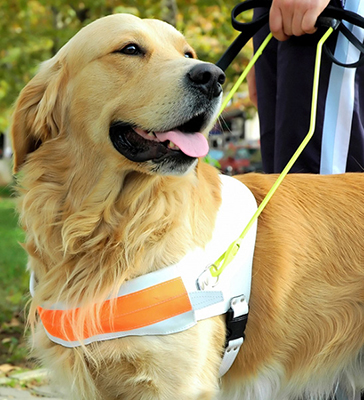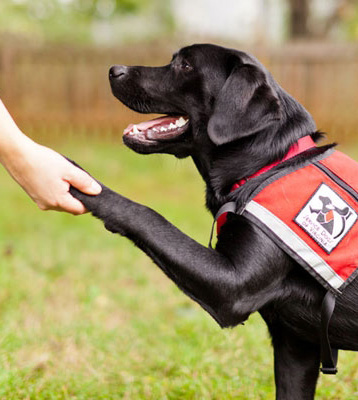
Service Animals
Introduction to Service Animals

Service animal as defined by Title II and Title III of the Americans with Disabilities Act of 1990:
A service animal is defined as a dog that is individually trained to do work or perform tasks for the benefit of an individual with a disability, including a physical, sensory psychiatric, intellectual, or mental disability.
The task(s) performed by the dog must be directly related to the person’s disability.
Any breed of dog, as well as miniature horses can be a service animal. The animal should be vaccinated in accordance to state and local laws.
Staff May Ask Only 2 Questions:
- Is the service animal required because of a disability?
- What work or tasks has the animal been trained to perform?
You cannot ask for documentation.
You cannot require animal to demonstrate task.
You cannot inquire about the person’s disability.
Handler's Responsibilities
The ADA requires the animal to be under control of the handler at all times. The handler is responsible for caring for and supervising the needs of the animal:
- Toileting
- Feeding
- Grooming and Veterinary Care
The animal must remain on a harness, leash, or other tether. If the handler is unable to hold a tether because of a disability, the animal must be under control by other means, such as voice control.
The service animal must be house broken.
Under Control
If the service animal is barking uncontrollably, jumping on other people, or running away from the handler, staff may request that the animal be removed from the premises.
Service Animals on Campus
Under the ADA, colleges and universities must allow people with disabilities to bring their service animals into all areas of the facility that are open to the public or students.
Emotional Support
Emotional support, therapy, comfort, or companion animals ARE NOT considered service animals under the ADA.
As they have not been trained to perform a specific job or task, they do not qualify as service animals under the ADA, and therefore no accommodation is required.
Resources

- Americans with Disabilities Act (ADA)
(800) 514-0301 (Voice)
(800) 514-0383 (TTY) - US Department of Education Office of Civil Rights
- KCTCS Office of General Counsel
- Terri DeAtley, Director of Policy Administration and Legal Analysis
terri.deatley@kctcs.edu
859-256-3294
- Terri DeAtley, Director of Policy Administration and Legal Analysis
ECTC Resources
For a list of Frequently Asked Questions (FAQ), go to Accessibility Services.
Office of Student Accessibility (inside the Assessment Center Office) RPC 1st Floor Room 129-ATeresa Brown, Director tbrown0641@kctcs.edu (270) 706-8455
